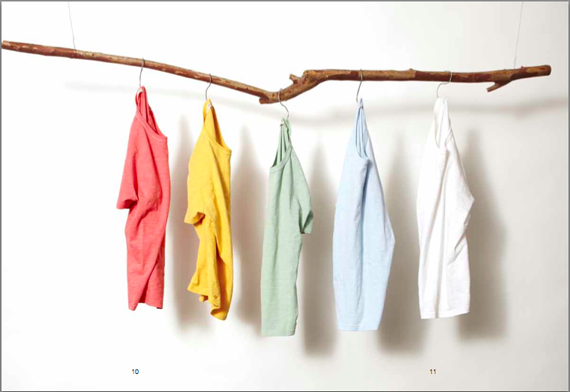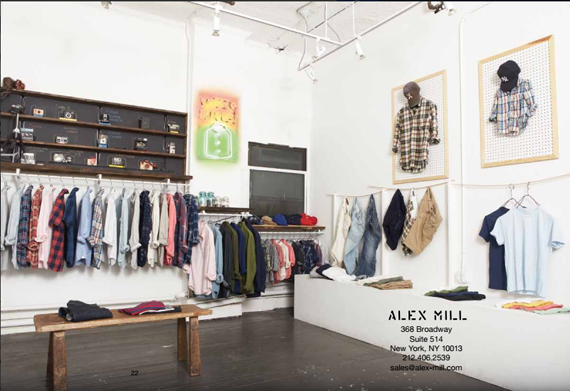
Last year, my son started his own business, called Alex Mill, a collection of clothing for men and boys. Fashion retail also happens to be his father's line of work, though the connection really does end there. While Alex certainly could have asked his father for help--and his father would have jumped in, happily--he instead chose to go it alone. Alex's last name was an advantage, of course, particularly in gaining quick publicity; most journalists couldn't help but mention Alex's well-known father. But while the two men never articulated it as such, I am confident both knew that if my husband joined the business in any meaningful way, Alex's chance of failure might decrease. But so, too, would the thrill that came with his success.
When Alex first told us about his plans to launch the brand, I had a brief moment of fear. Fear of the unknown--totally natural, of course. Even though I've been in an entrepreneurial family my entire married life, I didn't realize until framed in the context of my son that fear of the unknown is the very thing all entrepreneurs must first embrace, then learn to brush aside. I suppose, for me, not being able to see that until one of my children was directly involved was like pressing your face too close to the book. It's hard to read the details.

I've since had the pleasure of watching, as a parent--removed, but still very close--the entrepreneurial spirit in action. And it's given me a much clearer view of what it takes to launch a business, and even what it means to be able to create something from nothing in that way. First--and this is clear in how animated Alex becomes, how his face literally glows when he talks about the business--an entrepreneurial venture has to come from somewhere deep inside, a place non-entrepreneurs either can't reach or quite possibly don't have. As Steve Jobs put it in his beautiful and memorable 2005 Stanford commencement speech: "Have the courage to follow your heart and intuition. They somehow know what you truly want to become. Everything else is secondary."
While I knew Alex was following his heart and intuition when he dreamed up Alex Mill--and this was never a kid who readily shared emotions--and that his life has always been pointing him towards this career (and not only because of his father's vocation), I also knew that it took a while for Alex to realize it. But that realizing it, on his own, was essential. He'd considered a number of different careers before settling on fashion and retail, but it was that exploration that gave him the confidence and the education to embark on the Alex Mill adventure when he was ready. And as kids are wont to do, not a second before.

Not that he, or even I, are assured of his success. Almost 70 percent of start-up businesses survive two years, which isn't bad. But by year seven, that figure drops to 31 percent. The difference between success and failure, as my son is learning quickly, is part timing, part strategy and part luck. But as much as anything, success is a test of innate or absorbed qualities. It's a demanding mix of skills.
A year or so in, Alex still has a long road, and much work, ahead of him. It's not just a job, after all. Entrepreneurs are fully immersed in their business, in part because it's also an expression of who they are. Watching Alex truly agonize over how to make jeans that look like they've been washed and rewashed for a year, or chinos in exactly the right shade, or a website that works exactly the way he'd like it to, does not, then, worry me. Instead, it gives me a great feeling of contentment. He may appear to be stressed, but I know he's found himself, and is actually very happy.

Which will be another thing that proves to be an advantage, given that the most successful entrepreneurs are ferociously optimistic. "Things will work out because I'll make them work out," is a sort of de facto motto. And the uncertainty that was, as a parent, my instinct to question? Entrepreneurs thrive on it. My son thrives on it. He'd rather forge a trail than follow one. This was another reason he chose to take less advantage of his father's connections and experience than he might have. At the same time, as his mother I can recognize certain qualities he's learned from his father and see how they've served him in business, particularly the art of dealing with people. It's been fascinating.
As in life, there are no guarantees in retail. Success is a fickle lover--clingingly devoted today, then moving out tomorrow without a word. Of course, from the point of view of Mom, I think Alex's business will not only make it but go on to become a global retail powerhouse. But as any entrepreneur knows--as I know--there are a million factors that can lead to an outcome like that. One thing I do know, for certain: On a number of levels, my son's entrepreneurialism has been nothing less than a wondrous thing to watch.